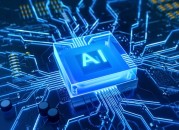Healthcare Revolutionized: The Impact of AI
artificial intelligence (AI) has revolutionized various sectors around the world. In recent years, AI has been transforming the healthcare industry, making healthcare more accessible and effective. This is evident in the way AI is helping healthcare professionals to diagnose, treat and manage various diseases.
AI in Disease Detection and Diagnosis
AI is changing the way diseases are detected and diagnosed. With deep learning and machine learning algorithms, AI can analyze large amounts of data and identify patterns that are not easily seen by humans. This is particularly useful in diagnosing diseases such as cancer where early detection is critical to the success of treatment.
The use of AI-enabled CT scans, MRIs, and X-rays is also revolutionizing diagnosis as these tools can easily detect and diagnose diseases that might have gone unnoticed previously. This has led to a significant increase in the rate of early detection and timely treatment, which has saved many lives.
AI-enabled Personalized Treatment
As AI technology advances, personalized care has become a reality. AI algorithms can collect and process medical data from individual patients, including genetics, lifestyle choices, and environmental factors, and generate personalized treatment plans. This allows doctors to provide tailored and precise treatment to each patient, increasing the efficacy of the treatment and improving patient outcomes.
AI is also transforming the field of pharmacology. With AI, doctors can more accurately predict drug efficacy and side effects, reducing the risk of negative reactions. AI can also identify new potential drug candidates in a fraction of the time it would take traditional methods, leading to new treatments and cures for various diseases.
AI-powered Remote Monitoring
Remote patient monitoring has been one of the most useful applications of AI in healthcare. With wearable technology and connected devices, AI can monitor patient data in real-time, detect early warning signs of disease and alert healthcare professionals to intervene before serious symptoms develop.
AI-powered monitoring systems can also provide healthcare professionals with valuable insights into patient behavior, such as their activity levels, dietary choices, and sleep quality. This data can be used to generate personalized treatment plans and interventions that improve patient outcomes.
AI and Medical Research
AI is also playing a significant role in medical research. With AI-enabled algorithms, researchers can analyze vast amounts of data and patterns to identify new potential treatments and cures for various diseases. By analyzing patient data, genetic information, and medical records, AI can help researchers develop personalized treatments and predictive models that improve the efficacy of treatment.
AI is also transforming clinical trials by making them more efficient and cost-effective. By analyzing data from previous trials, researchers can optimize the design of new trials, identify potential risks, and predict outcomes. This has led to faster approvals for new treatments and improved patient outcomes.
Conclusion
From disease diagnosis and treatment to remote monitoring and medical research, AI has revolutionized the healthcare industry. With its ability to analyze vast amounts of data, identify patterns, and generate personalized treatment plans, AI has improved patient outcomes and saved countless lives.
The impact of AI in healthcare will continue to grow in the coming years, paving the way for new treatments, cures, and interventions. As AI technology continues to advance, healthcare professionals will be able to provide more precise and personalized care, allowing patients to lead healthier and happier lives.
评论列表
暂无评论,快抢沙发吧~
热门文章
文章目录
支付宝
微信









欢迎 你 发表评论: